Below is a select list of individual and joint publications by ECCI members
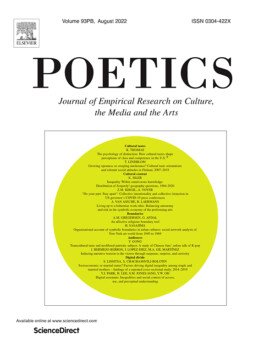
Thinking Through Technique
Poetics • Special Issue
Despite growing concerns over the ability of conventional research methods to effectively tackle key theoretical issues within the contemporary sociology of culture, these have yet to produce concerted efforts at rethinking existing methods, let alone at crafting novel techniques of sociological inquiry. As a result, there is a steadily widening gap between our variegated theoretical conceptions of ‘culture’ and the actual tools that we use to put these conceptions to the empirical test. This special issue aims to address this gap by exploring a series of new methods designed to chart the role of culture in everyday life. The various contributions to this issue start from the premise that conventional techniques of sociological research very often constrain our understanding of culture and effectively limit the types of questions we come to ask of it. To overcome such constraints, each paper presents a method that is designed to tap into different and often un(der)explored aspects of culture: from the issue of how we effectively ‘experience’ cultural forms or the problem of how we can systematically articulate and describe the embodied dimension of ‘culture-in-action’ to the question of the classificatory principles that inform our everyday esthetic judgments or the genesis of these principles in early childhood. Together, the different contributions to this issue aim to demonstrate that a more rigorous approach to core theoretical issues among contemporary scholars of culture inevitably implies a more systematic effort at ‘thinking through’ the conventional toolkit of cultural sociology. This special issue for the journal Poetics originated in the “Thinking Through Technique” workshop that ECCI organized in the Fall of 2019 with John Levi Martin as special guest. It features several contributions from ECCI members including Kuipers, Jappens and Vandebroeck.
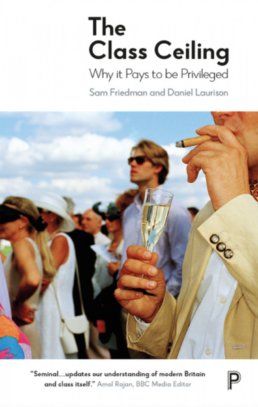
The Class Ceiling • Sam Friedman & Daniel Laurison
Politicians continually tell us that anyone can get ahead. But is that really true? This important, best-selling book takes readers behind the closed doors of elite employers to reveal how class affects who gets to the top. Friedman and Laurison show that a powerful ‘class pay gap’ exists in Britain’s elite occupations. Even when those from working-class backgrounds make it into prestigious jobs, they earn, on average, 16% less than colleagues from privileged backgrounds. But why is this the case? Drawing on 175 interviews across four case studies – television, accountancy, architecture, and acting – they explore the complex barriers facing the upwardly mobile. This is a rich, ambitious book that demands we take seriously not just the glass but also the class ceiling.

Toward a European Social Topography
European Societies • special issue
In 2014 members of ECCI and the Network for the Studies of Cultural Distinctions and Social Differentiation (SCUD) met in Brussels for a 2-day workshop entitled ‘Charting Social Space’. In this workshop sociologists from Norway, France, Switzerland, Belgium, Denmark, Finland, Sweden and the United Kingdom convened to discuss the contemporary relevance of Pierre Bourdieu’s concept of ‘social space’. Breaking with one-dimensional measures of class status, Bourdieu proposed to conceptualize social structure as a multidimensional social space. This space not only differentiates actors in terms of their overall possession of scarce resources, but also in terms of their relative possession of economic and cultural assets. The goal of this workshop was to ascertain whether this model, that was originally developed to describe France in the 1970s could be generalized to other historical and national contexts.
The proceedings of this workshop formed the basis of ‘Toward a European Social Topography’, a special issue of European Societies, the flagship journal of the European Sociological Association.
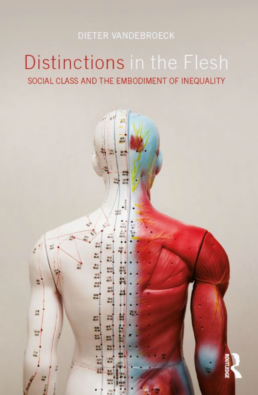
Distinctions in the Flesh • Dieter Vandebroeck
The past decades have witnessed a surge of sociological interest in the body. From the focal point of aesthetic investment, political regulation and moral anxiety, to a means of redefining traditional conceptions of agency and identity, the body has been cast in a wide variety of sociological roles. However, there is one topic that proves conspicuously absent from this burgeoning literature on the body, namely its role in the everyday (re)production of class-boundaries. Distinctions in the Flesh aims to fill that void by showing that the way individuals perceive, use and manage their bodies is fundamentally intertwined with their social position and trajectory. Drawing on a wide array of survey-data – from food-preferences to sporting-practices and from weight-concern to tastes in clothing – this book shows how bodies not only function as key markers of class-differences, but also help to naturalize and legitimize such differences. Along the way, it scrutinizes popular notions like the ‘obesity epidemic’, questions the role of ‘the media’ in shaping the way people judge their bodies and sheds doubt on sociological narratives that cast the body as a malleable object that is increasingly open to individual control and reflexive management.
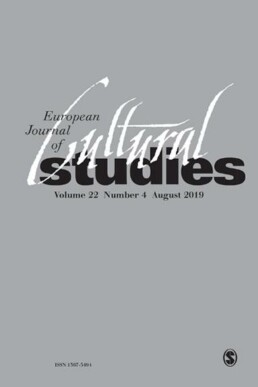
Clouded judgments? Aesthetics, morality and everyday life in early 21st century culture
European Journal of Cultural Studies • Special issue
This special issue investigates the relationship between aesthetics and morality. How do the good and the beautiful, the bad and the ugly, happen in everyday life? How do these ‘orders of worth’ interact? Do they reinforce each other? What happens when they contradict one another? Does one order typically trump the other? Five contributions, from Israel, Italy and the Netherlands, scrutinize different sites where both aesthetics – the continuum of evaluations from beautiful to ugly – and morality – evaluations about good and evil, right and wrong – have a strong presence. The contributions zoom in on everyday cultural consumption, where people create, seek out and discuss ‘good’ food, clothing, films and architecture, and professional situations where people look for ‘good’ jobs, want to work in ‘good’ work spaces and aim to be a ‘good’ worker. Integrating insights from cultural studies, sociology, valuation studies and science and technology studies, this special issue shows, first, how judgments of aesthetic and moral value are central to the fabric of social life – from the smallest level of everyday interactions to the large scale of economic relations and power im/balances. Second, these valuations often clash, blend and blur. This blurring and blending enables the drawing of social boundaries, the consolidation of identities and the shaping of selves. But it also allows for seduction, manipulation and obfuscation of power dynamics. Third, the contributions show that in contemporary post-Fordist, meritocratic consumer societies, beauty and morality are increasingly entangled with economic and political logics, leading to new social struggles and new forms of alienation and exploitation.
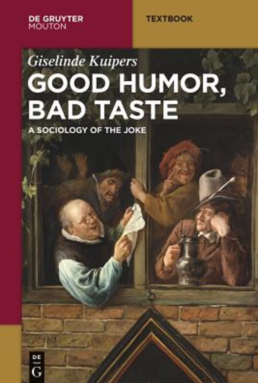
Good Humor, Bad Taste. A Sociology of the Joke • Giselinde Kuipers
Good Humor, Bad Taste is the first extensive sociological study of the relationship between humor and social background. Using a combination of interview materials, survey data, and historical materials, the book explores the relationship between humor and gender, age, regional background, and especially, humor and social class in the Netherlands. The final chapter focuses on national differences, exploring the differences between the American and the Dutch sense of humor, again using a combination of interview and survey materials. The starting point for this exploration of differences in sense of humor is one specific humorous genre: the joke. The joke is not a very prestigious genre; in the Netherlands even less so than in the US. It is precisely this lack of status that made it a good starting point for asking questions about humor and taste. Interviewees generally had very pronounced opinions about the genre, calling jokes “their favorite kind humor”, but also “completely devoid of humor” and “a form of intellectual poverty”. Good Humor, Bad Taste attempts to explain why jokes are good humor to some, bad taste to others. The focus on this one genre enables Good Humor, Bad Taste to have a very wide scope. The book not only covers the appreciation and evaluation of jokes by different social groups and in different cultures, and its relationship with wider humor styles. It also describes the genre itself: the history of the genre, its decline in status from the sixteenth century onward, and the way the topics and the tone of jokes have changed over the last fifty years of the twentieth century.
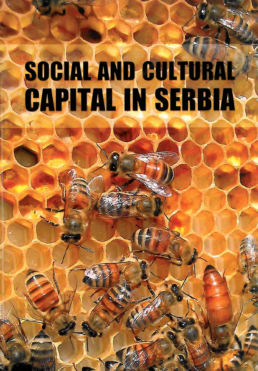
Social and cultural capital in Serbia • Predrag Cvetičanin (ed.)
The major role that social capital plays in the generation of social inequalities represents one of the specificities of socialist and post-socialist societies. In our studies of the mechanisms that create social inequalities in Serbia, we identified two sub-types of social capital, which we labeled as ‘political social capital’ (or ‘social capital of powerful connections’) and ‘social capital of solidarity’. We also differentiate between two sub-types of cultural capital: local and global cultural capital. The book ‘Social and Cultural Capital in Serbia’, based on the research project of the same name, supported within the Regional Research Promotion Programme in the Western Balkans (RRPP), focuses on investigating the structure of distribution of various types and sub-types of capital and of the strategies of individuals and social groups based on different combinations of these resources. In this book, members of our research team were particularly interested in studying the use of social and cultural resources in shaping strategies of individuals in everyday life and the social and symbolic struggles of their holders – trying to introduce different types of social closure mechanisms based on those capitals that work best to their advantage.
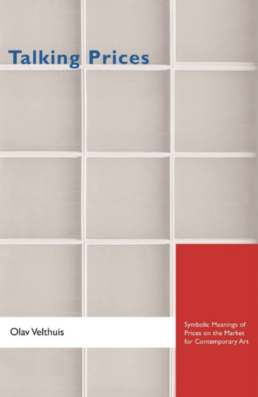
Talking Prices • Olav Velthuis
How do dealers price contemporary art in a world where objective criteria seem absent? Talking Prices is the first book to examine this question from a sociological perspective. On the basis of a wide range of qualitative and quantitative data, including interviews with art dealers in New York and Amsterdam, Olav Velthuis shows how contemporary art galleries juggle the contradictory logics of art and economics. In doing so, they rely on a highly ritualized business repertoire. For instance, a sharp distinction between a gallery’s museumlike front space and its businesslike back space safeguards the separation of art from commerce. Velthuis shows that prices, far from being abstract numbers, convey rich meanings to trading partners that extend well beyond the works of art. A high price may indicate not only the quality of a work but also the identity of collectors who bought it before the artist’s reputation was established. Such meanings are far from unequivocal. For some, a high price may be a symbol of status; for others, it is a symbol of fraud.
